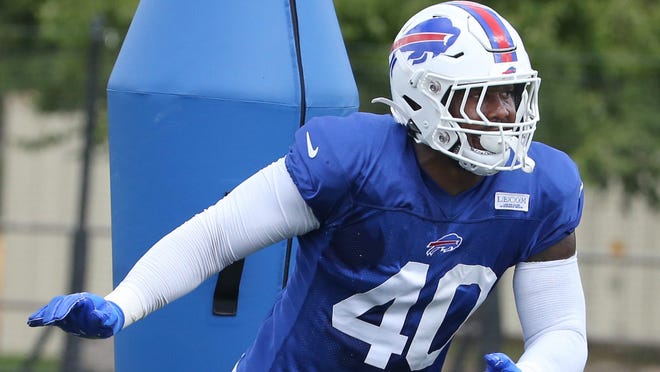The NFL and Deshaun Watson have reached a settlement.
Rather than wait for former New Jersey attorney general Peter Harvey’s decision on the NFL’s appeal of the initial punishment handed down, the league and Cleveland Browns quarterback have agreed that Watson will be suspended 11 games and fined $5 million for violating the league’s personal conduct policy amid allegations of sexual misconduct, the NFL announced on Thursday. Watson also agreed to mandatory counseling as part of the deal.
The agreement overrides jointly appointed disciplinary officer Sue L. Robinson’s Aug. 1 ruling that Watson should serve a six-game suspension. However, the settlement falls well short of the yearlong ban that the NFL had asked Robinson to level against Watson.
NFL NEWSLETTER:Sign up now for exclusive content sent to your inbox
“I’m grateful that the disciplinary process has ended and extremely appreciative of the tremendous support I have received throughout my short time with the Browns organization,” Watson said in a statement. “I apologize once again for any pain this situation has caused. I take responsibility for the decisions I made. My focus going forward is on working to become the best version of myself on and off the field and supporting my teammates however possible while I’m away from the team. I’m excited about what the future holds for me in Cleveland.”
Watson was sued by 24 women alleging sexual misconduct in massage sessions in 2020 and early 2021 during the quarterback’s time in Houston.
All but one of those 24 lawsuits have been settled out of court with confidential agreements. The Texans reached confidential settlements with 30 women with claims related to Watson after being accused of enabling his behavior and not stopping it.
Robinson determined that Watson “engaged in sexual assault (as defined by the NFL)” against four women the league outlined in its case against the quarterback. In not issuing a longer suspension, however, Robinson said she was bound by the league’s past precedent for “non-violent” sexual misconduct offenses.

Acting in accordance with the terms of the collective bargaining agreement, the NFL appealed Robinson’s decision. NFL commissioner Roger Goodell could have presided over the proceedings but instead appointed Harvey, who helped the NFL craft the current personal conduct policy, as the arbitrator.
Harvey’s review of the information presented to Robinson and his deliberations extended into his second week prior to the settlement reached by Watson and the NFL.
Watson will be eligible to return in Week 13 to face off against his former team in the Texans.
Now, the Browns must turn their attention to preparing Jacoby Brissett to serve as the starting quarterback in the interim.
Although Watson agreed to the settlement, he is still set to serve a ban and punishment of unprecedented weight for what Robinson categorized as “non-violent” offenses.
Wide receiver Antonio Brown served an eight-game suspension in 2020 for multiple personal conduct policy violations. Dallas Cowboys running back Ezekiel Elliott in 2017 served a six-game suspension for domestic violence accusations.
In 2015, then-Cowboys pass-rusher Greg Hardy received a suspension of 10 games for domestic violence, but an arbitrator reduced that punishment to four games. Steelers quarterback Ben Roethlisberger in 2010 received a six-game suspension for allegations of sexual assault from two women. However, Goodell later reduced that punishment to four games.
In addition to length, the fine leveled against Watson marks unique territory for the league, as players have previously only forfeited game checks when serving suspensions for personal conduct violations. But the measure of the fine was triggered in part by frustrations in the league office over the way the Browns structured Watson’s contract when they traded for him in the spring. Watson signed a record fully guaranteed $230 million contract, but Cleveland allotted only a base salary of $1.035 million for 2022. That figure would help the quarterback avoid suffering a more significant financial loss in the event that he was suspended for a portion of this season.
In its argument to Robinson, the NFL Players Association contended that the league had created a double standard with the personal conduct cases involving team owners (who are to be held to a higher standard, according to the collective bargaining agreement) and those of players. The union also argued that the league showed more grace to white players (using Roethlisberger as an example) while handing Watson, who is Black, an unprecedented punishment to make an example of him.
Settlement talks had taken place well before Robinson issued her ruling, but the sides failed to find a middle ground at that time.
Contributing: Brent Schrotenboer, Lorenzo Reyes
